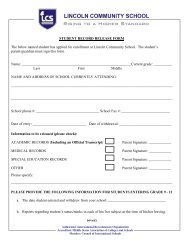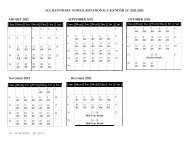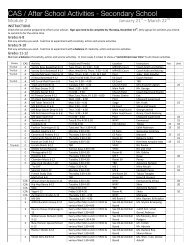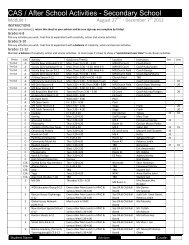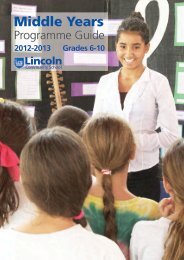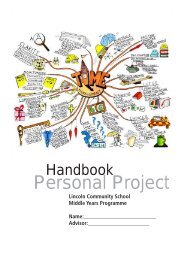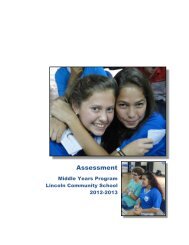French/Spanish - Lincoln Community School
French/Spanish - Lincoln Community School
French/Spanish - Lincoln Community School
You also want an ePaper? Increase the reach of your titles
YUMPU automatically turns print PDFs into web optimized ePapers that Google loves.
• Demonstrate an awareness that the students, too, have a culture, drawing on comparisons of sample daily activities in the<br />
target culture and their own.<br />
• Hypothesize on why certain products originate in and/or are important to particular cultures by analyzing selected products<br />
from the target cultures and the students' own.<br />
• Hypothesize about the relationship between cultural perspectives and practices (e.g., holidays, celebrations, work habits,<br />
play) by analyzing selected practices in the target culture and the students' own.<br />
• Hypothesize about the relationship between cultural perspectives and expressive products (e.g. music, visual arts,<br />
appropriate forms of literature) by analyzing selected products from the target cultures and their own.<br />
Communities<br />
Use the language both within and beyond the school setting.<br />
• Discuss preferences concerning leisure activities and opinions concerning current events, in writing or orally, with<br />
speakers of the target language.<br />
• Interact with members of the local community to learn how they use various languages in their fields of work.<br />
• Present information about the target language and culture to others.<br />
• Participate in club activities which benefit the school or community.<br />
• Write and illustrate stories to present to others.<br />
• Perform for a school or community celebration.<br />
Show evidence of becoming life-long learners by using the language for personal enjoyment and enrichment.<br />
• Consult various sources in the language to obtain information on topics of personal and/or academic interest.<br />
• Play sports or games from the target culture.<br />
• Exchange information about topics of personal interest with peers and/or speakers of the target language.<br />
• Use various media from the language and culture for entertainment.<br />
• Attend, or view via the media, cultural events and social activities in the target language and/or from the target culture.<br />
• Listen to music, sing songs, or play musical instruments from the target culture.<br />
Phases 5-6 Proficient Communicators<br />
Communication<br />
Students engage in conversations, provide and obtain information, express feelings and emotions, and exchange<br />
opinions.<br />
• Discuss, orally or in writing, current or past events that are of significance in the target culture or that are being studied in<br />
another school subject.<br />
• Develop and propose solutions to issues and problems that are of concern to the students' own and the target cultures.<br />
• Share analyses and personal reactions to expository and literary texts.<br />
• Exchange, support, and discuss opinions and individual perspectives with peers and/or speakers of the target language on a<br />
variety of topics dealing with contemporary and historical issues.<br />
Understand and interpret written and spoken language on a variety of topics.<br />
• Demonstrate an understanding of the main ideas and significant details of live and recorded discussions, lectures, oral<br />
presentations, newspaper and magazine articles, and other written presentations on current or past events in the target<br />
culture* or on topics that are being studied in another class.<br />
• Demonstrate an understanding of the principal elements of non-fiction articles in newspapers, magazines, and e-mail on<br />
topics of current and historical importance to members of the culture.<br />
• Analyze the main plot, subplots, characters, themes, and symbolism in authentic literary texts.<br />
• Demonstrate an increasing understanding of the cultural nuances of meaning in written and spoken language as expressed<br />
by speakers of the target language in formal and informal settings.<br />
• Demonstrate an increasing understanding of the cultural nuances of meaning in expressive products of the culture,<br />
including selections from various literary genres and the visual arts.<br />
Present information, concepts, and ideas to an audience of listeners or readers on a variety of topics.<br />
• Perform scenes and/or recite poems or excerpts from short stories connected to a topic from disciplines such as world<br />
history, geography, the arts, or mathematics.<br />
• Perform scenes from plays and/or recite poems or excerpts from short stories commonly read by speakers of the target<br />
language.<br />
• Create stories and poems, short plays, or skits based on personal experiences and exposure to themes, ideas, and<br />
perspectives from the target culture.<br />
• Select and analyze expressive products of the culture from literary genres or the fine arts.<br />
• Summarize the content of an article or documentary intended for native speakers in order to discuss the topics, via the<br />
Internet, with other users or speakers of the language.<br />
• Write a letter or an article describing and analyzing an issue for a student publication.<br />
• Prepare a research-based analysis of a current event from the perspective of both the United States and the target cultures.<br />
4



